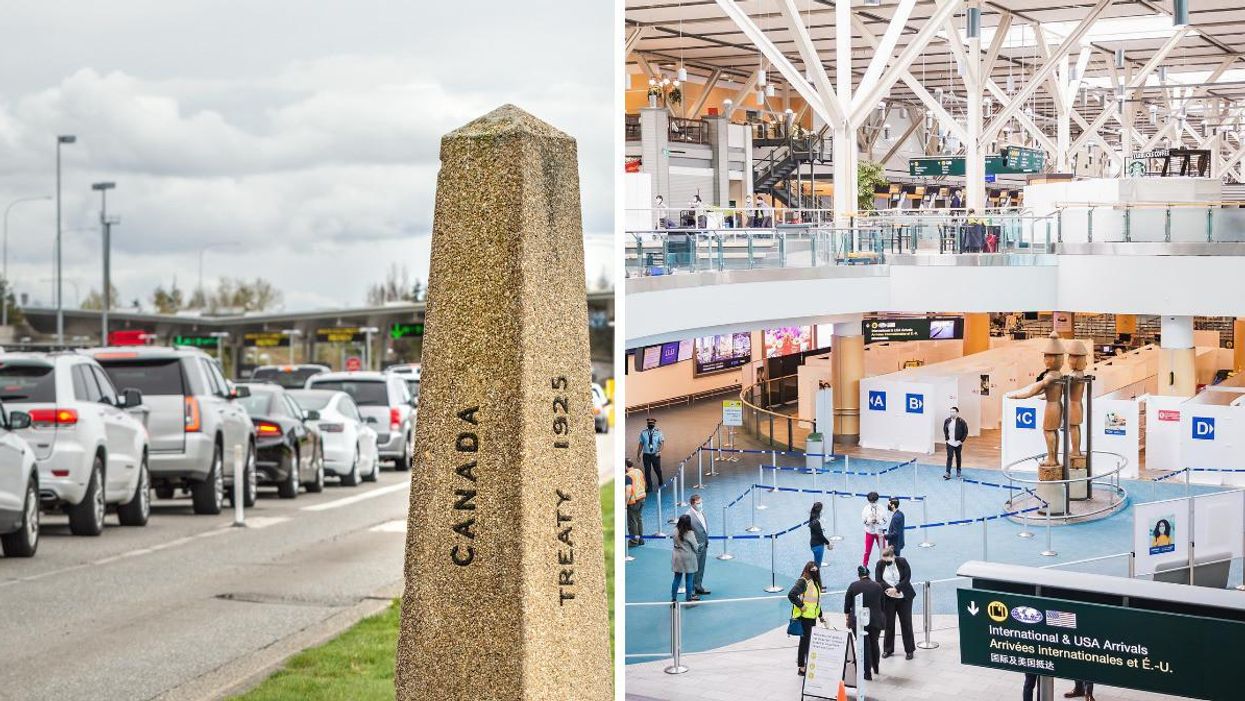Canada's Travel Restrictions Were Just Updated & Here's What You Need To Know
Changes are coming, travellers! 🇨🇦

Vehicles wait at a Canada-US border crossing and, right, a generic image inside Vancouver International Airport.
The federal government has announced a series of changes to Canada's travel restrictions and it seems like taking a trip abroad is about to get a little easier.
On February 15, federal ministers confirmed that testing measures at the border and the global travel advisory would be changing, among other things.
The feds say the updates are possible "because of a number of factors, including Canada’s high vaccination rates, the increasing availability and use of rapid tests to detect infection, decreasing hospitalization rates and growing domestic availability of therapeutics and treatments."
In case you missed them, here's everything you need to know about the adjustments and what's to come on Monday.
Testing requirements
Today, we announced new border measures:pic.twitter.com/caXHtDYyIM— Omar Alghabra (@Omar Alghabra) 1644951746
As of Monday, February 28 at 12:01 a.m. EST, the federal government will ease on-arrival testing measures for fully vaccinated travellers.
Fully vaxxed individuals arriving in Canada (from any country) will be randomly selected for arrival testing — just like before the discovery of the Omicron variant.
Those who are chosen for testing will no longer be required to quarantine, either.
At the moment, everybody who arrives in the country is subject to on-arrival testing and must quarantine while awaiting their test result.
From the same date, travellers will also have the option to use a rapid antigen test or a molecular test to meet pre-entry requirements.
It means people will be able to choose a cheaper rapid antigen test to enter Canada if they want, although it must be authorized by the country in which it was purchased and be administered by a laboratory, health care entity or telehealth service.
A rapid antigen test must be taken the day before an individual's arrival in Canada, while a molecular test result must be taken within 72 hours prior to entry.
Global travel advisory
Beginning February 28, 2022 border measures are changing. Get the latest information here: https://ow.ly/4ms650HVWuP\u00a0pic.twitter.com/oVIlAxSrcC— Health Canada and PHAC (@Health Canada and PHAC) 1644954218
The feds also confirmed their plans to adjust Canada's Travel Health Notice from a level 3 to a level 2.
It means that as of February 28, the government will no longer urge Canadians to avoid all non-essential travel, like vacations, abroad.
Instead, they will just advise travellers to be cautious when taking international trips and to keep in mind that they could face complications if travel measures were to change at short notice.
Travellers will likely find it easier to get travel insurance coverage for their trips now that officials are no longer advising against all discretionary holidays.
Travel rules for kids
It's also going to get easier for fully vaxxed parents to take their kids on international vacations.
Restrictions on unvaccinated children under 12 will be lifted as of February 28, meaning they will no longer need to wait before going to school or daycare.
At the moment, children must wait two weeks before attending school, camp or daycare after going abroad.Airports reopening
The #NOTAM that restricts where international passenger flights can arrive in Canada will expire on February 28, 2022 at 4pm EST. https://ow.ly/JCPk103p0cf— Transport Canada (@Transport Canada) 1644953471
As of February 28, Transport Canada's Notice to Airmen will also be lifted, meaning that more international passenger flights will be permitted to arrive in Canada again.
Right now, only 18 Canadian airports are currently able to receive international flights. However, this will soon be expanded to include all international airports in the country.
Announcing the news, Transport Minister Omar Alghabra said, "This is great news for communities like Windsor, London, Fort McMurray, Moncton and many others."
"By receiving international flights, this will support local tourism, create good jobs and grow our economy."
He said that the government will work with airports to put appropriate safety measures in place to allow international flights to return.
What hasn't changed?
Despite the adjustments for fully vaccinated travellers, the rules are still the same for those who remain unvaccinated against COVID-19.
Unvaccinated travellers must continue to test on arrival, on day eight and quarantine for 14 days.
Foreign nationals who have not received an approved vaccine will not be permitted to enter Canada unless they meet one of the few exemptions.
Additionally, ArriveCAN isn't going anywhere. All travellers — regardless of their vaccination status — must continue to submit their information via the free app or website.
While travel rules are shifting, the feds warned on Tuesday that "Canada’s border measures will remain flexible and adaptable, for potential future scenarios.”
Before you get going, check out our Responsible Travel Guide so you can be informed, be safe, be smart, and most of all, be respectful on your adventure.
This article's cover image was used for illustrative purposes only.
- Canada's Global Travel Advisory Is Changing Soon & Here's What It ... ›
- More Canadian Airports Will Open On February 28 & It's Good News ... ›
- Canada's Travel Restrictions Are Easing This Month & Testing ... ›
- Canada's Travel Restrictions Are Changing & It Means COVID-19 Tests Will Be Cheaper - Narcity ›
- The EU Wants To End Restrictions For Some Travellers & Here's What It Means For Canadians - Narcity ›
- 6 Things The Feds Want You To Know About Canada's New Travel Rules Before You Go Abroad - Narcity ›
- People Want To Travel To Canada Again & These Cities Are Being Searched For Most - Narcity ›
- Rapid Antigen Tests Are Now Accepted For Travel In Canada But At-Home Tests Are Not Enough - Narcity ›